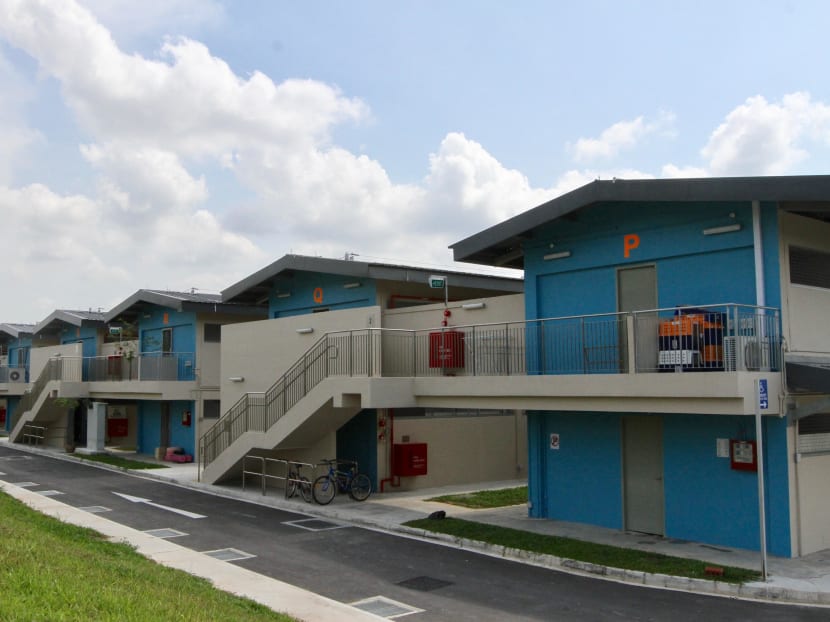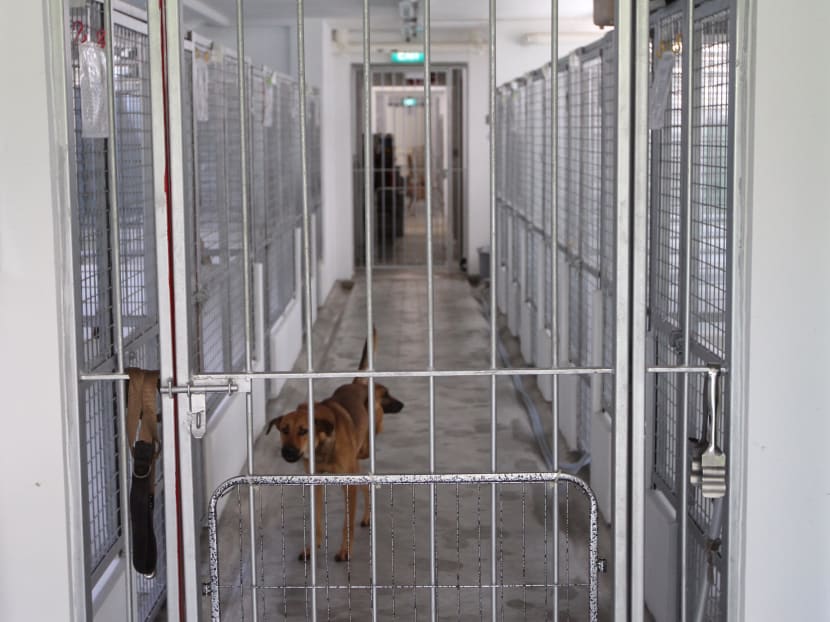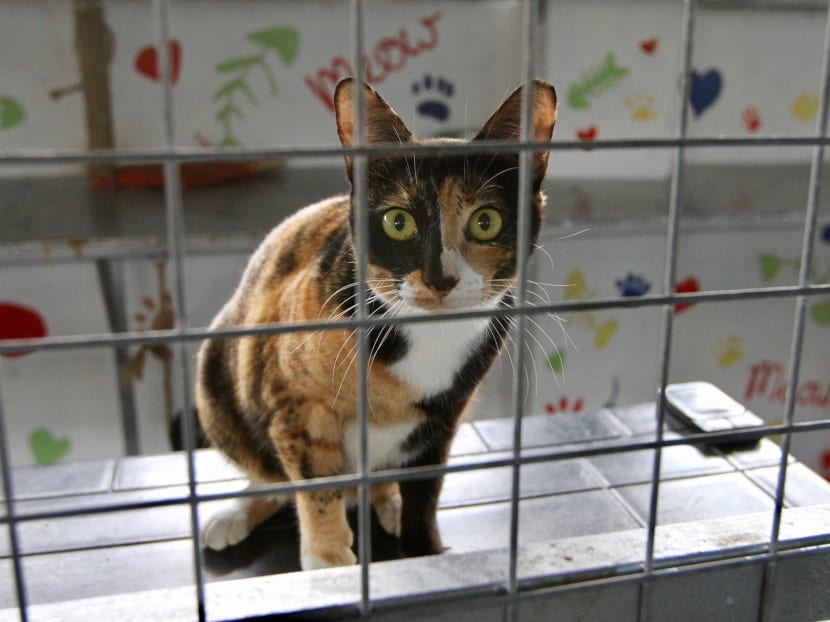Understaffed animal welfare groups at Tengah lodge seek the authorities' help to hire foreign workers
SINGAPORE — Struggling to care for the dogs and cats under their charge at the new Tengah Animal Lodge, several animal welfare groups have appealed to the authorities for help to hire foreign workers.
SINGAPORE — Struggling to care for the dogs and cats under their charge at the new Tengah Animal Lodge, several animal welfare groups have appealed to the authorities for help to hire foreign workers.
Groups that have already moved to the lodge said they are buckling under the strain, while the Animal Lovers League (ALL), which will be moving nearly 300 dogs and some 200 cats to Tengah in about a fortnight, said access to foreign labour is a “very pressing need”.
.embed-container { position: relative; padding-bottom: 56.25%; height: 0; overflow: hidden; max-width: 100%; } .embed-container iframe, .embed-container object, .embed-container embed { position: absolute; top: 0; left: 0; width: 100%; height: 100%; }At their previous location in Pasir Ris, the organisations had foreign workers supplied by their landlords, such as Ericsson Pet Farm and Pet Movers, as part of the tenancy arrangement. The workers came from countries such as Bangladesh, Myanmar and the Philippines.
But the move to Tengah put an end to such arrangements, and some shelter representatives said they have been working 10 to 14 hours each day since moving to the new premises.
“Every day I do (chores including cleaning, prepping of food, feeding) non-stop and take my lunch at only 4pm or 5pm,” said Mr Ray Yeh, the owner of BFF, which has 105 cats and 23 dogs at Tengah.
“It’s sheltered here so it’s more difficult to wash (the enclosures), as opposed to the open concept in Pasir Ris,” said a representative of another animal welfare group, who declined to be named.

The “critical” situation was highlighted by another group, the Oasis Second Chance Animal Shelter (Oscas), in its June newsletter.
“In the past, our rental package included assignment of a foreign worker to work for us. We animal welfare groups are now in a dire state as majority of us cannot afford to employ local workers in view of the high salaries and attendant legal employment terms… With five units spread upstairs and downstairs, we need at least two workers,” stated the newsletter which was signed off by Oscas chairman Mary Soo.
Ms Soo told TODAY that the Agri-food and Veterinary Authority (AVA) told the groups before their move that it would not be providing workers for the units. According to previous reports, a unit can house about 25 dogs.
“However, we were confident that being charities with limited resources to employ locals, the government would grant us assistance in securing at least one foreign worker,” said Ms Soo. “We were shocked that the Ministry of Manpower is not relenting to our plea and equally shocked that… this was not taken into consideration when the authorities were planning to house all of us under one roof in their care.”
She added: "Those of us with three units and above find it extremely impossible to do the work ourselves. We are all exhausted and just wonder how long more we can go on."
OPTIONS: ENGAGE MANAGING AGENT, OR MEET WORK PASS REQUIREMENTS
An AVA spokesperson told TODAY that stakeholders have been advised to consider engaging the services of the lodge's managing agent – listed on AVA's website as Guthrie FMC – or tapping foreign labour subject to "mainstream work pass requirements for the services sector".
"AVA will continue to work with the relevant authority regarding stakeholders’ manpower-related requests," said the spokesperson, adding that it works closely with stakeholders to identify appropriate solutions to concerns raised.

Ms Soo said it was not viable to engage the managing agent’s services because they would be provided at fixed times, and “we can’t leave the (pee and poo) until the cleaner comes”.
“As it is the place is already… packed with so many dogs, so can you imagine the smell all of us will have to bear with. In the end we will only incur more medical costs both for us humans and the animals,” she said.
About six groups raised the foreign-labour issue with the AVA about two months ago, three groups told TODAY.
“Time is running out because we are going to move (to Tengah) in about two weeks,” said ALL co-founder Mohan Div. “We need to expedite.”
Mr Mohan said his organisation hopes to hire the Bangladeshi workers who were seconded to it at Pasir Ris, as they are familiar with the animals. The workers were employed by its landlord and returned to Bangladesh at the end of June because most of the shelters had moved out of Pasir Ris by then, he said.
Mr Yeh said foreign-manpower regulations put the non-profits at a disadvantage compared to commercial players.
With tight budgets that do not allow them to pay higher salaries to hire locals, the groups are hoping to be exempted from manpower quotas that require them to hire Singaporeans before being able to hire foreigners. Local workers tend to be less able to work shifts and quit after a short period, they added.
“It’s all about cost. We’re a charity, not a business. We pay what we can and the rest are volunteers helping out,” said Mr Mohan. Work-permit holders could be paid about S$600 to S$800 per month, while a Singaporean worker’s salary could be S$1,600 a month or more, he estimated.
ALL may need more manpower at the Tengah lodge because of the tighter space and the need for more coordination and oversight of people going in and out of the enclosures, said Mr Mohan.
The groups said volunteer numbers have dropped since the move from eastern to western Singapore. This is also due to the relatively remote location of the Tengah lodge, which is about 1km from the nearest bus-stop.
Labour woes are the latest challenge in the mass migration of animals to the 7,000-capacity Tengah lodge, which the Government built to provide an option for organisations affected by land leases expiring at Loyang, Seletar and Lim Chu Kang.
Concerns were previously raised about the facility’s design, such as poor ventilation and lack of a sheltered loading bay, and costs involved in relocating there.
The AVA said it tried to take the groups’ feedback into consideration, such as by redesigning the space for communal kennels. It said it charges rental rates at cost-recovery, waived the rental security deposit, and provided a rent-free period as well as a one-off relocation assistance package of S$7,500 per unit for the groups.
Sign up for TODAY's WhatsApp service. Click here:







